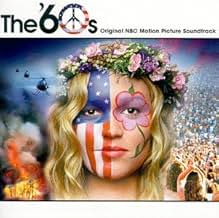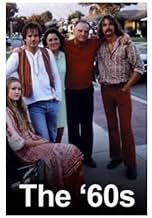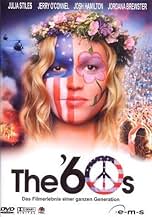IMDb RATING
6.9/10
2.7K
YOUR RATING
The events of the 1960s affect the lives of two families, one white and one black.The events of the 1960s affect the lives of two families, one white and one black.The events of the 1960s affect the lives of two families, one white and one black.
- Nominated for 3 Primetime Emmys
- 2 wins & 10 nominations total
Browse episodes
Featured reviews
I caught this movie on TV last night, I don't usually enjoy this particular kind of movie, but I was bored so I figured I'd sit through it.
Now I've seen other comments on how the movie doesn't show the era correctly, that it's not historically correct, and since I wasn't alive yet during the 60s, and my European education didn't touch the subject of american history much, I can't comment on that.
However, when you get past the idea of this movie having to be a historical document of the 60s, and see that it's actually just simply a story, not a history lesson, about a group of people during this period of time, you'll see that this story is actually quite enjoyable.
I expected a mediocre history movie, I got a great movie about love, principles and family. It made my evening.
Now I've seen other comments on how the movie doesn't show the era correctly, that it's not historically correct, and since I wasn't alive yet during the 60s, and my European education didn't touch the subject of american history much, I can't comment on that.
However, when you get past the idea of this movie having to be a historical document of the 60s, and see that it's actually just simply a story, not a history lesson, about a group of people during this period of time, you'll see that this story is actually quite enjoyable.
I expected a mediocre history movie, I got a great movie about love, principles and family. It made my evening.
As a 17 year old who gets to always hear about the 60s second-hand this movie "took" me to the 60s. I really liked that all the kids in the Herily (sp?) family encompassed many of the kids of that time. One was a Vietnam vet, one an activist against the war, and one a hippie who ends up at Haight-Ashbury and the Hog Farm. From what I have heard this movie is very accurate and even noted the date and year of an event. The black family was great and the idea that they participated in the sit-ins and Freedom marches, and then to live in Watts, LA during the Watts riots was a great idea. I thought the climax was a great mixture of events that took place in 1965. I know there were a lot of stereotypes, but how else would we learn about the 60s with out a movie that encompassed all the feelings, looks, and ideas of the time. I loved the music but was upset that only one song was on there by The Beatles. Obviously, they forgot what an impact the Beatles had on the American culture and leaving it out was a mistake. All the other music was GREAT and I love the song by Bob Dylan and Joan Osbourne. All in all this movie was great. And I hate that people say there was too much romance and love, but hey, it was the 60s. Sex and drugs was a prominent thing in that era. You can't forget it. I give it a 9.5/10, for leaving the Beatles out.
What the movie The 60s really represents (to those of us who growled around in the belly of America in those times) is the turbulence and diversity of the decade. Despite the exaggerated, stereotyped characters, the genuineness of the issues remains clear.
Not only were those radical times of change, but also very confusing times. Two basic things changed our world then: the 1964 Civil Rights Act, and the overwhelming influence of the media. Those two new freedoms began social changes that soon became institutionalized.
From chaos came sensitivity, from disorder came values. Bear in mind however, that the bulk of Americans were not involved in this... they worked, they played, they watched the news... and slowly they became effected by the efforts and struggles of the minorities... the Civil Rights workers, the Political Activists, the Anti-War efforts, the War on Poverty....
The representation of the power of the press and TV in particular, was well reflected, although the conflict between the general public's attitude and those seeking to change things was at best ignored... and at worst, misrepresented.. Middle class Americans weren't all standing around angrily holding baseball bats, or disowning their wayward daughters. They were confused too. Let us not forget how Folk Singers suddenly became Protest Singers, and how The Beatles began an onslaught that killed the Folk-Protest Movement. There are no Beatle songs in the movie, or even any mention of them.
I think if you didn't live the decade, you might not have a sense of what the movie is about, the overall picture is a bit dim. At one point I held down a steady job while my sister lived at the Hog Farm Commune and went to Woodstock. At another point I was in Haight Asbury and in the Detroit Riots while she worked and played the housewife in Maine and Connecticut. Roles were constantly changing.
The movie depicts three siblings of a middle class family. They represent the hippie child, the political activist, and the active military personnel. Dad represents the typical attitudes, and mom represents the voice of reason, tolerance, and sometimes compromise... for the sake of peace.
The Black family comprises a minister and his son... disproportionately, I think. I assume the producers knew all the variables and had to settle on limitations, or else the film would have become a long, boring, documentary. Dad's message was that anger produces bitterness, and bitterness produces chaos. It was clearly a message directed to today's youth.
We are looking at a unique solution to social problems, and also how issues divide us... The 60s were unusual in that way, and only the Roaring 20s compare. In other words, this movie has a moral after all. In the end, it is our Collective Individualism that survives. Put that in your oxymoron list.
Everyone was a God, a Guru, or a free-spirited genius in the 60s. It was a time of magic and madness. No one will ever nail the 60s down right... it was too diverse (this movie is close). At least we can say we are not ashamed of it, that we learned and grew from it, and that for once, a generation shaped and changed America... for the better.
Not only were those radical times of change, but also very confusing times. Two basic things changed our world then: the 1964 Civil Rights Act, and the overwhelming influence of the media. Those two new freedoms began social changes that soon became institutionalized.
From chaos came sensitivity, from disorder came values. Bear in mind however, that the bulk of Americans were not involved in this... they worked, they played, they watched the news... and slowly they became effected by the efforts and struggles of the minorities... the Civil Rights workers, the Political Activists, the Anti-War efforts, the War on Poverty....
The representation of the power of the press and TV in particular, was well reflected, although the conflict between the general public's attitude and those seeking to change things was at best ignored... and at worst, misrepresented.. Middle class Americans weren't all standing around angrily holding baseball bats, or disowning their wayward daughters. They were confused too. Let us not forget how Folk Singers suddenly became Protest Singers, and how The Beatles began an onslaught that killed the Folk-Protest Movement. There are no Beatle songs in the movie, or even any mention of them.
I think if you didn't live the decade, you might not have a sense of what the movie is about, the overall picture is a bit dim. At one point I held down a steady job while my sister lived at the Hog Farm Commune and went to Woodstock. At another point I was in Haight Asbury and in the Detroit Riots while she worked and played the housewife in Maine and Connecticut. Roles were constantly changing.
The movie depicts three siblings of a middle class family. They represent the hippie child, the political activist, and the active military personnel. Dad represents the typical attitudes, and mom represents the voice of reason, tolerance, and sometimes compromise... for the sake of peace.
The Black family comprises a minister and his son... disproportionately, I think. I assume the producers knew all the variables and had to settle on limitations, or else the film would have become a long, boring, documentary. Dad's message was that anger produces bitterness, and bitterness produces chaos. It was clearly a message directed to today's youth.
We are looking at a unique solution to social problems, and also how issues divide us... The 60s were unusual in that way, and only the Roaring 20s compare. In other words, this movie has a moral after all. In the end, it is our Collective Individualism that survives. Put that in your oxymoron list.
Everyone was a God, a Guru, or a free-spirited genius in the 60s. It was a time of magic and madness. No one will ever nail the 60s down right... it was too diverse (this movie is close). At least we can say we are not ashamed of it, that we learned and grew from it, and that for once, a generation shaped and changed America... for the better.
This mini-series did an excellent job of portraying the sixties, with a minimum of exaggeration and a fairly even-handed presentation of the differing sides. It did far better than Forrest Gump in this respect. I have shown it to my children, so that they can see this historical period more vividly than just by reading a book in school. I thought it was extremely well done, and I can't understand why there is so little information given for it (cast, crew, etc.). It would be nice to know who played what...
Generally, whenever I watch the networks attempt to depict American History I wind up on the front lawn randomly swearing at autos that pass my house, (until my wife turns on the sprinklers and forces me back inside.) But in spite of a few eye-rolling plot twists and cheesy lines, this is one of the very best docudramas I've EVER watched. Starting with the idealism of JFK, this movie is jam-packed full of references to a plethora of real historical events and personalities that defined the 1960s. Every single event and person is not flagged and explained. If you get it you get it, if you don't you don't. The better-read the viewer is, the more they will appreciate the numerous references. Abby Hoffman, Jerry Rubin, Tom Hayden, electric Dylan at Newport, Joan Baez, Martin Luther King, the Lorraine Motel, Wavy Gravy, the Zapruder Film, Bull Connor, Bobby Seale, Black Panther breakfast program, "Soul on Ice," "Free Huey," The Hog Farm, The Gray Line Bus tours of Haight-Ashbury, the Weathermen, The Chicago Seven, Selma, Birmingham, "brown acid," Days of Rage, CO status, Watts riot, Cafe Wha?, Phil Ochs, Kettle of Fish, and on and on and on. If you are extremely literate in the real history of the Sixties you will find a wealth of information awaiting you in this 3 and-a-half hour tour. All right, so "Do You Believe in Magic" wasn't released until AFTER the troop train protest was held in Berkley but that is a minor point to get all steamed up over. Generally this is a feast for the literate student of the 1960s.
Did you know
- TriviaActors Donovan Leitch Jr. and Carnie Wilson are the respective children of musicians Donovan and The Beach Boys' singer and composer Brian Wilson, both of whom are heard in the soundtrack. Jason Nesmith, son of ex-Monkee Michael Nesmith, also appears.
- GoofsBrian tries to get another man to buy him a beer, saying that he is not old enough to do so. The drinking age in Illinois in 1962 was 18 and Brian would have to be at least that to enlist in the military then.
- Quotes
Bill Herlihy: Are you still my baby?
Katie Herlihy: No, dad, I grew up. But I am still your daughter.
- Alternate versionsA scene where Katie and her friends gathered in front of her television to watch The Beatles performance on the Ed Sullivan show was originally shown in NBC's first broadcast of the mini-series but ended up getting cut out of all the home video versions of the film (including NBC's own 2 tape set which could only be ordered straight from the network). The scene is also missing from later presentations of the film on networks such as VH1. In the scene Katie and her friends sit on the floor in front of the television and scream in delight at the sight of The Beatles while Katie's brother, Michael, sits behind them secretly trying to brush his hair down so that he can look like the famous quartet.
- ConnectionsFeatured in The 51st Annual Primetime Emmy Awards (1999)
- How many seasons does The '60s have?Powered by Alexa
Details
- Release date
- Country of origin
- Language
- Also known as
- American 60's
- Filming locations
- Redlands, California, USA(Columbia campus scenes)
- Production companies
- See more company credits at IMDbPro
Contribute to this page
Suggest an edit or add missing content


































